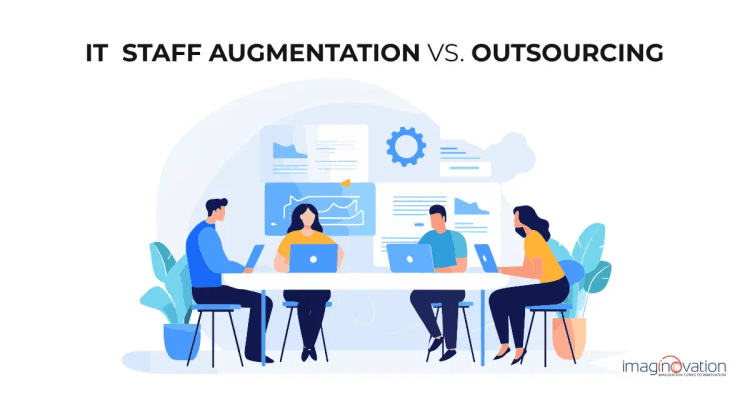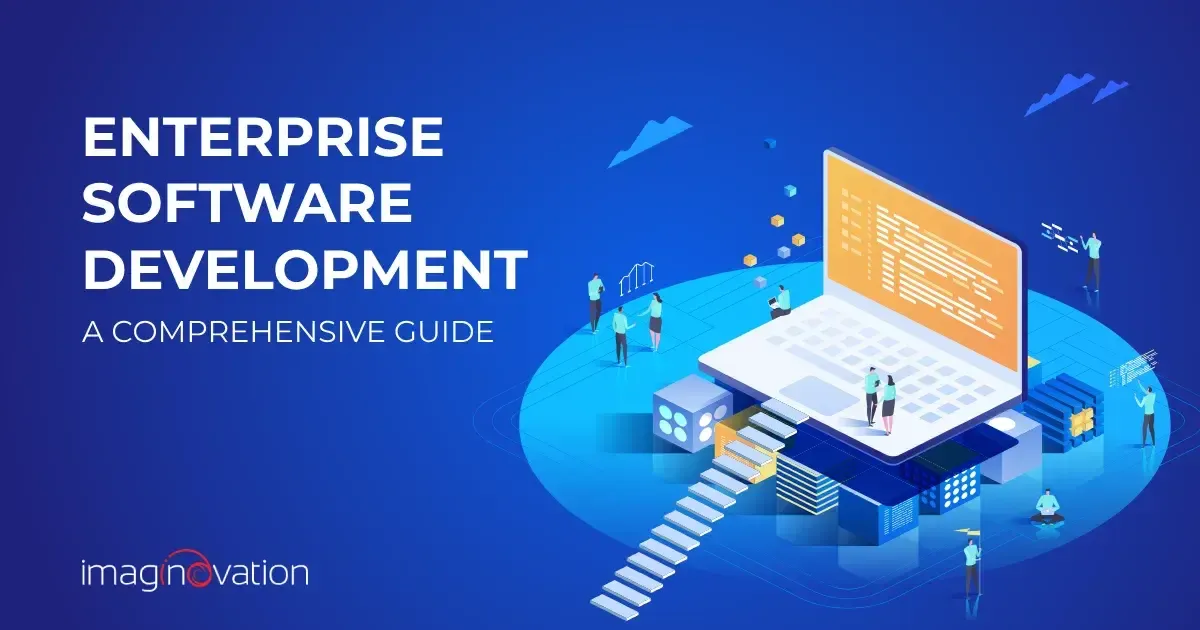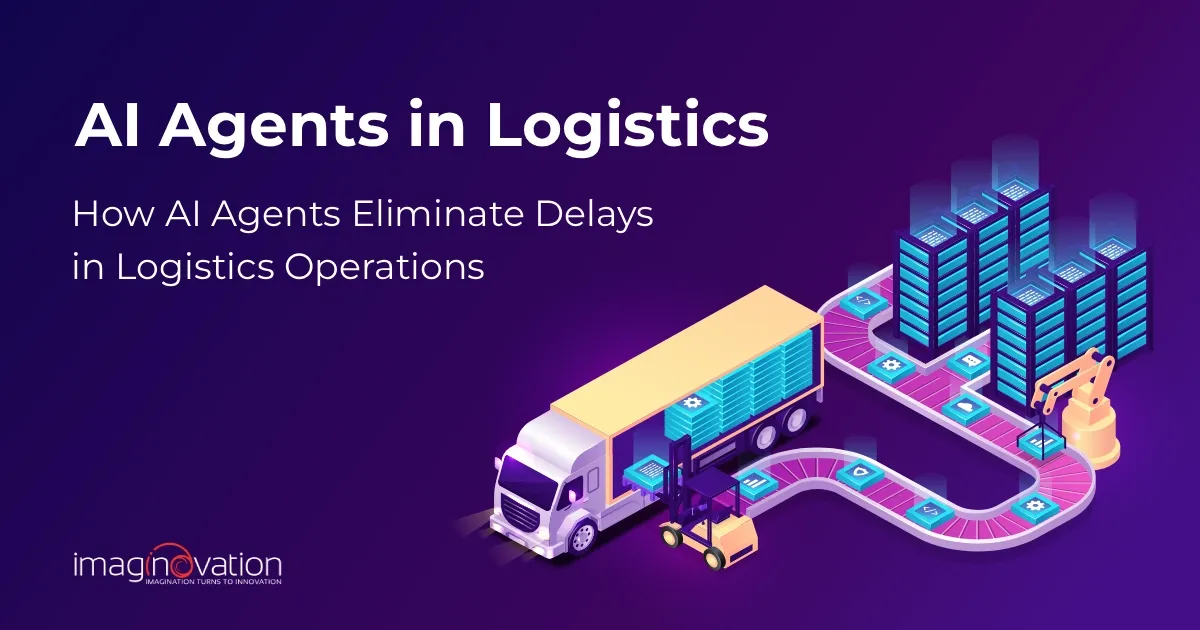To estimate the cost of building a website or an app, use our app cost calculator tool.
Choosing the right growth strategy in tech can be a turning point for your business. IT staff augmentation and outsourcing each offer distinct advantages, but understanding which pathway aligns with your company’s needs can be challenging.
Do you integrate skilled professionals into your existing team to enhance your capabilities, or do you delegate entire projects to an external party to focus on core competencies?
This article breaks down the pros and cons of IT staff augmentation versus outsourcing, providing the clarity needed to make an informed choice that propels your business forward.
Understanding IT Staff Augmentation and Outsourcing
IT staff augmentation is an outsourcing model that enables companies to hire skilled IT professionals to perform specific tasks.
This model helps a company fill a skills gap, handle massive workloads, or meet project deadlines without permanently increasing the company’s workforce.
The augmented staff works alongside the in-house team, either remotely or at the company’s physical location, on a permanent or short-term basis.
As such, the company assumes direct control of the professionals and the project and can integrate other resources on hire into its operations.
Conversely, outsourcing is the complete transfer of a company’s IT functions to a third party.
The company could outsource various services, including app development, technical support, or infrastructure management.
This model leaves the vendor in complete control of the project and must deliver the desired output according to the agreed terms.
The premise for using this model is to minimize costs, access specialized skills, and increase efficiency.
Benefits of IT Staff Augmentation
The premise for IT staff augmentation is to fill a skill set gap without making long-term commitments. This staffing model has several advantages:
Access to Top Talent
Staff augmentation provides access to professionals with specific skill sets your company lacks.
The professionals boast in-depth knowledge in specific fields, so you’re confident that your projects receive the expertise they need.
Moreover, you have the freedom to choose teams of professionals who possess complementary skills.
This way, your professionals with the right blend of talent can handle diverse challenges, leading to top-tier results.
Minimal Recruitment Costs and Time
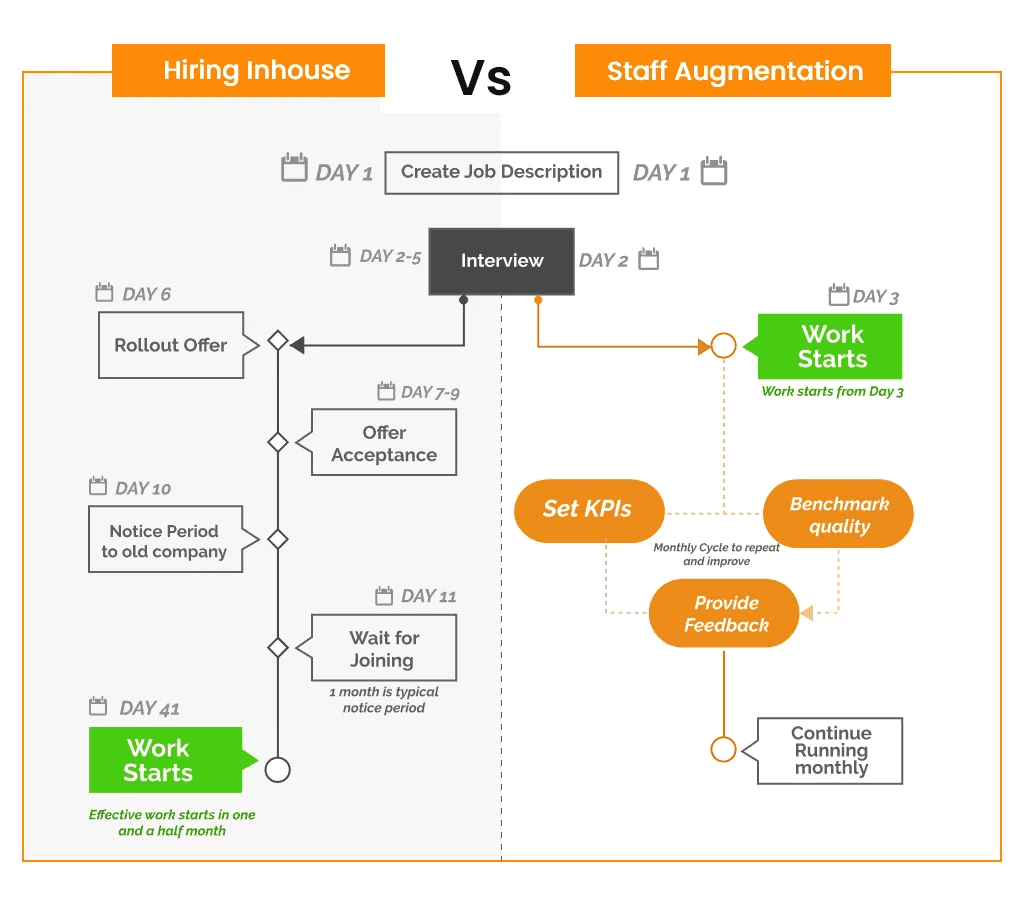
This chart compares the process of hiring new staff through staff augmentation and traditional hiring processes. Companies spend a day to hire new staff through staff augmentation and up to 41 days using the traditional hiring method.
Onboarding new talent is time-consuming and expensive for any company. There’s the process of advertising the position(s), conducting interviews, and selecting the most suitable candidates.
Staff augmentation provides a more cost-effective way of hiring and recruiting staff than traditional hiring.
A business only needs to liaise with the staff augmentation provider to hire the best-suited person for the role, saving time and money.
Staffing Flexibility
The appeal of staff augmentation lies in its flexibility. You can increase or reduce your team based on project demands.
Whether you’re looking for a small, large, or cross-functional team on a short- or long-term basis, this model affords you this luxury.
A report by McKinsey found that companies that leverage flexible workforces report higher revenue.
Advantages of IT Outsourcing
IT outsourcing is predicted to grow exponentially in the next few years. According to Statista, global revenue from this market will likely increase by $265.3 billion between 2024 and 2028. Here’s why:
Ability to Focus on the Core Business
IT outsourcing is helpful for small and medium-sized companies with few IT resources. The model allows them to outsource critical IT functions so they can concentrate on the core business.
This benefit is particularly advantageous for companies engaged in non-IT business activities.
Access to a Wider Pool of Skilled Professionals
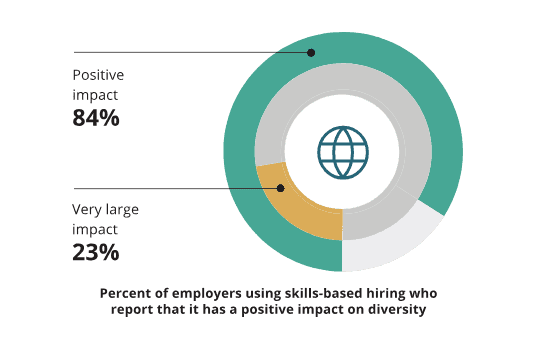
A report on the state of skills-based hiring found that 84% of companies find skill-based hiring to be more effective than traditional hiring models. Moreover, 23% of these companies experienced a larger impact.
Sometimes, finding an employee with a specific skill set is challenging. And it’s more tasking to train an in-house team. IT outsourcing provides access to a team of professionals with diverse skills you can leverage to execute a project.
A 2023 study on skill-based hiring found that 70% of respondents agreed that the approach was more effective than resumes.
Work with a Dedicated Team
It helps to have a dedicated team when working on a long-term project, and IT outsourcing grants you this advantage.
The service provider has an exclusive team that adapts to the project’s demands and delivers results promptly.
Comparing IT Staff Augmentation vs. Outsourcing
At first glance, IT staff augmentation and outsourcing seem similar, but they aren’t. They differ in their level of control, approach, and suitability for specific project needs.
This comparison table summarizes their differences:
| Differentiating Factor | IT Staff Augmentation | IT Outsourcing |
|---|---|---|
| Purpose | To fill a skill gap temporarily | To execute a project’s IT functions because the company doesn’t want to hire or set up a team in-house |
| Management Responsibility | The in-house team manages the professionals on hire | The third party or service provider manages the team |
| Level of Control | The hiring company has direct control of the augmented staff | The company has less direct control because the service provider manages the workforce |
| Scalability | You can scale the team upwards or downwards based on the project’s needs | There’s limited scalability because the company must perform contractual changes to scale upwards or downwards |
| Duration of Engagement | Often on a temporary basis, e.g., a few weeks or months to fill a skill gap | Can be long-term or short-term based on the project’s needs |
| Integration | The professional(s) blend into the company’s IT team | The service provider operates independently based on the project’s requirements |
| Risk | Poses a lower risk because the in-house team is still responsible for managing the project | Poses a higher risk because the service provider is solely responsible for the project |
| Skill Focus | The company hires professionals with specific expertise | The hired team is responsible for all the IT functions, processes, and projects |
| Innovation | Promotes innovation through collaboration | Innovation depends on the service provider’s approach |
| Onboarding | It’s almost instant because the client can access on-demand skills or resources quickly | Takes longer because the project’s requirements, deliverables, and milestones must be defined before hiring the team. Moreover, both parties must sign contractual agreements before the project proceeds |
| Cost | It’s cheaper than hiring professionals on a full-time basis but more expensive than outsourcing | Lower cost based on location advantages and economies of scale. For example, the company may hire a team that works remotely. |
| Training | The new staff are trained to help them align with the organization’s objectives, culture, etc. | The company has little or no control over training |
The decision to opt for staff augmentation or outsourcing is based on several factors:
The Business Needs
Assess the scope of the project at hand, its duration, and required skills. Staff augmentation is ideal for short-term projects, while IT outsourcing is more suitable for ongoing projects.
Project Complexity
Less complex projects may need the input of an augmented member for collaboration and communication. As such, staff augmentation is a better pick.
Conversely, complex projects require the input of a diverse set of skills, which are only available through IT outsourcing. The service provider sets up a team of skilled individuals to execute the projects.
Project Risks
We must also assess the risks associated with each approach. On the one hand, IT staff augmentation allows direct control of the staff members, minimizing risks related to data security and confidentiality.
On the other hand, IT outsourcing requires entrusting critical functions to a third party, posing severe data security risks.
As such, the company must vet potential service providers carefully and sign contracts to mitigate risks. This can be a tedious process for both parties; hence, there is a need to ensure outsourcing is the most viable solution for the project.
Scalability
Assess the model’s scalability in the event of increased project demands. Companies that use IT staff augmentation services experience challenges when they want to scale.
They may need to scout for more professionals to execute additional tasks or look for an IT staff augmentation partner with a vast network of IT talents. This can be time-consuming.
By comparison, IT outsourcing doesn’t restrict scalability. The service provider can add more professionals to the team based on the project’s demand.
Integration into Existing Systems
Both staffing models require professionals to understand the company’s existing business processes for flawless integration.
This can be a complex endeavor, especially when enlisting the help of an IT outsourcing company. The service provider must understand the company’s existing processes before making any deliverables.
By contrast, staff augmentation makes integration with existing systems nearly flawless. The professional only needs a little training to understand the existing systems before beginning work.
Potential Partner’s Track Record
Companies look for professionals or third parties that have handled similar projects to increase the probability of success.
Checking the professionals’ track record and past projects is a great way to determine if they’re ideal partners for the project.
IT outsourcing requires a more rigorous verification process because you’re entrusting an entire project to a third party.
This arrangement requires a certain level of transparency and trust; finding such a partner can be challenging. Hiring the wrong partner can lead to significant losses.
Companies can perform rigorous checks before hiring service providers, e.g., by:
- Checking the provider’s track record
- Checking the scope of past projects
- Finding out about the provider’s reputation
- Checking their client retention rate
All such insights help mitigate risks, especially if the company collaborates with an offshore service provider.
Partner with Imaginovation for Your IT Needs
IT staff augmentation and outsourcing offer IT solutions for companies needing expert knowledge. They help companies save on the time and money spent onboarding staff, particularly for software development projects.
Choosing between IT outsourcing and staff augmentation depends on your company’s needs. But we can help you make that decision.
Whether you prefer outsourcing IT functions or augmenting an IT professional to your business, we’re ready to partner with you. Our team offers technical expertise and strategic insight to help you navigate the complexities of software development.
You’re not just selecting a vendor but a partner you can rely on for many years. Talk to us today.





